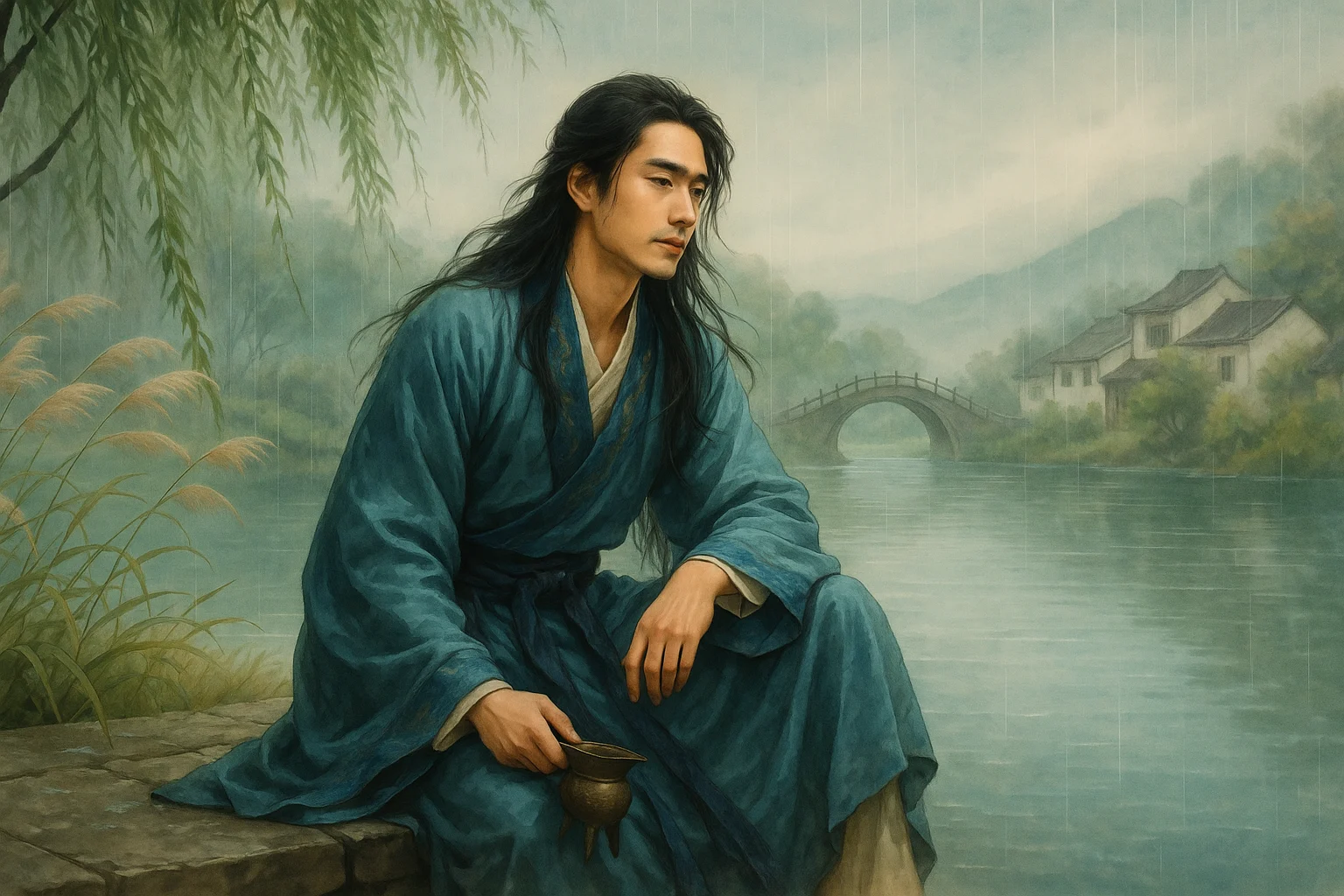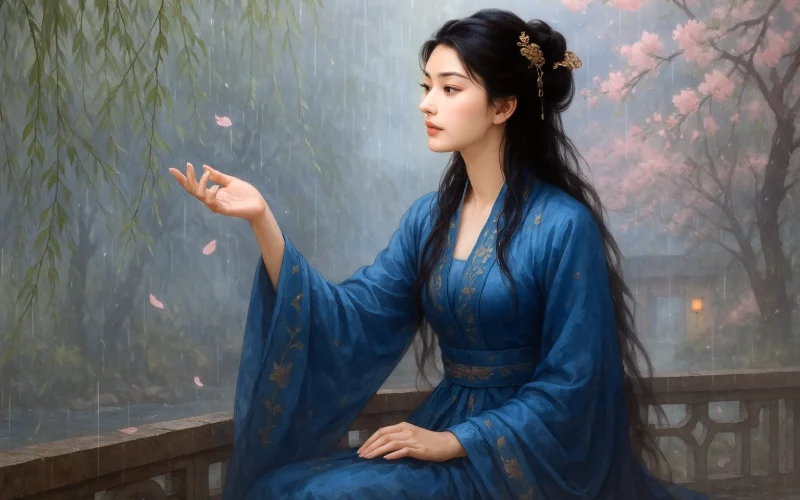The six-fold railings nestle by the jade-green tree,
Where willow breezes sway their golden threads so free.
Who moves the zither’s pegs adorned with flowery gold?
Through beaded curtains, paired sea swallows swiftly flee.
My eyes fill with drifting floss and falling blooms,
As apricots blush red—then sudden rain assumes.
From deep sleep I wake to orioles’ senseless cries,
My lovely dream now lost beyond the gloom.
Original Poem
「鹊踏枝 · 六曲阑干偎碧树」
六曲阑干偎碧树,杨柳风轻,展尽黄金缕。
谁把钿筝移玉柱?穿帘海燕双飞去。满眼游丝兼落絮,红杏开时,一霎清明雨。
冯延巳
浓睡觉来莺乱语,惊残好梦无寻处。
Interpretation
As a prominent minister serving before Li Yu, the last ruler of the Southern Tang, Feng Yansi was also a pioneering figure in the kingdom's poetic circles. His ci poems, characterized by delicate sentimentality, excelled in portraying romantic longing and boudoir melancholy. This work, composed during the Southern Tang's culturally flourishing period, exemplifies the era's refined and subtle poetic style, particularly the popular theme of feminine solitude and separation. Adopting a female persona, the poem depicts a woman's spring afternoon where scenery stirs emotion, weaving dream and awakening into a tapestry of loneliness, embodying the "scene within feeling, feeling within scene" aesthetic of the graceful and restrained style.
First Stanza: "六曲阑干偎碧树,杨柳风轻,展尽黄金缕。谁把钿筝移玉柱?穿帘海燕双飞去。"
Liù qū lán gān wēi bì shù, yáng liǔ fēng qīng, zhǎn jìn huáng jīn lǚ. Shuí bǎ diàn zhēng yí yù zhù? Chuān lián hǎi yàn shuāng fēi qù.
Winding railings embrace emerald trees,
willow strands sway in gentle breeze,
unfolding golden threads to their ease.
Whose jeweled zither stirs jade pegs' song?
Through curtains, paired seabirds dart along.
This stanza paints a tranquil spring courtyard: railings, willows, zither notes, and flying swallows compose a soft yet luminous tableau. Visually, it interweaves verdant trees, willow filaments, and golden light; aurally, it blends delicate zither tones with swallows' wingbeats. Emotionally, it hints at the woman's solitude through the zither's implied melancholy and the swallows' coupled flight—a poignant contrast to her singleness. Scene and sentiment merge with profound subtlety.
Second Stanza: "满眼游丝兼落絮,红杏开时,一霎清明雨。浓睡觉来莺乱语,惊残好梦无寻处。"
Mǎn yǎn yóu sī jiān luò xù, hóng xìng kāi shí, yī shà qīng míng yǔ. Nóng shuì jiào lái yīng luàn yǔ, jīng cán hǎo mèng wú xún chù.
Gossamer flurries fill the air,
as apricots blush—suddenly there,
a Qingming shower dampens the fair.
From deep sleep, orioles' chatter flows,
startling sweet dreams none can disclose.
Transitioning from scene to emotion, this stanza employs "floating gossamer," "falling catkins," and "blooming apricots"—all symbols of spring's fleeting beauty. The brief "Qingming rain" carries rich symbolism, its pure-and-bright festival atmosphere tinged with chill, mirroring the woman's mood. Dreams may offer solace, but awakening leaves only void; the concluding "none can disclose" elevates wistfulness to heartrending pathos, transforming spring's depth into elegiac tenderness.
Holistic Appreciation
The poem begins with a spring scene in the courtyard, layering imagery of willow trees, zither notes, paired swallows, drifting catkins, and spring rain to construct a luminous yet ethereal portrait of boudoir-bound springtime. Beneath this seemingly tranquil surface, emotional undercurrents quietly intensify—from hearing the zither and observing swallows, to awakening from dreams and hearing orioles' chaotic chatter—gradually revealing the woman's solitude and melancholy. Rather than stating emotions directly, the poet masterfully conveys her inner world through environmental shifts and domestic details.
The concluding couplet—"Awakening from deep sleep to orioles' disorderly chatter / startling my sweet dream beyond recovery"—lands with natural yet powerful resonance. The frustration and loss of interrupted dreams are captured perfectly in fourteen characters, epitomizing the classic lyrical style where "emotion resides in scenery, and scenery reveals emotion."
Artistic Merits
- Emotion-Infused Scenery: Spring landscapes become vessels for boudoir sentiments; though "sorrow" is never named, it permeates every image.
- Exquisite Imagery and Language: "Golden threads," "inlaid zither," "gossamer filaments," and "clear-bright rain" are all poetic, culturally rich motifs.
- Subtle Expression of Profound Feeling: Inner turmoil emerges indirectly—through paired swallows, interrupted dreams—eschewing explicit declaration.
- Organic Structure with Clear Layers: The first stanza paints external beauty and movement, while the second turns inward to emotional turbulence, creating striking contrast.
Insights
This ci teaches that in literary expression, emotions can seep through the minutest details—revealing the internal by depicting the external, conveying motion through stillness. The woman's grief remains unstated yet becomes palpable in a wisp of gossamer or an oriole's cry, moving readers deeply. It reminds us to attend to life's subtle shifts and overlooked small things, which often best reflect our truest feelings. Moreover, it demonstrates how artistic creation need not be explicit; restraint and implication often yield the most enduring resonance.
About the Poet

Feng Yansi (冯延巳 903 - 960), courtesy name Zhengzhong, was a native of Guangling (modern-day Yangzhou, Jiangsu) and a renowned ci poet of the Southern Tang during the Five Dynasties and Ten Kingdoms period. Rising to the position of Left Vice Director of the Department of State Affairs (Zuo Puye Tongping Zhangshi), he enjoyed the deep trust of Emperor Li Jing. His ci poetry forged a new path beyond the Huajian tradition, directly influencing later masters like Yan Shu and Ouyang Xiu, playing a pivotal role in the transition of ci from "entertainment for musicians" to "literary expression of scholar-officials."












